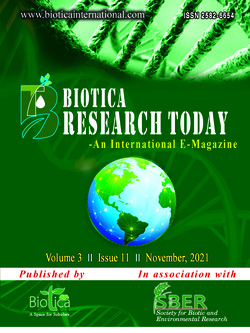
Achieving Drought Tolerance in Rice by Targeted Genome Editing
Swagat Kumar Tripathy
Center for Biotechnology, Siksha ‘O’ Anusandhan Deemed to be University, Bhubaneswar, Odisha (751 003), India
Prasanta Kumar Majhi*
Dept. of Plant Breeding and Genetics, Regional Research and Technology Transfer Station, Odisha University of Agriculture and Technology, Keonjhar, Odisha (758 002), India
Ayaz Ahamad
Biosciences Group, Homi Bhabha National Institute, Bhabha Atomic Research Centre, Mumbai, Maharashtra (400 094), India
DOI: NIL
Keywords: CRISPR/Cas, Drought stress, Genome editing, Rice
Abstract
Rice is one of the major sources of food that feeds half of the world’s population, but the yield is significantly reduced due to several biotic and abiotic stresses. Among the abiotic stresses, drought is very severe which negatively affects plant growth, development and production, is a critical form of environmental stress. Drought stress affects diverse biochemical aspects, in addition to physiological and morphological traits, which are crucial for plant growth. Recent advancements in Genome Editing Technologies (GETs) involve the development of a clustered, regularly interspaced short palindromic repeats (CRISPR)/ CRISPR-associated protein (Cas) system to achieve the desired goal. CRISPR-Cas-mediated genome editing has proven a dynamic tool for rapid and high-throughput reconfiguration of endogenous genes. Among these, the CRISPR/Cas9 system is the most efficient, easier, promising, reliable and widely adopted, for improving yield and stress resilience.
Downloads
not found
Reference
Barrangou, R., Marraffini, L.A., 2014. CRISPR-cas systems: Prokaryotes upgrade to adaptive immunity. Molecular Cell 54, 234-244.
Ogata, T., Ishizaki, T., Fujita, M., Fujita, Y., 2020. CRISPR/Cas9-targeted mutagenesis of OsERA1 confers enhanced responses to abscisic acid and drought stress and increased primary root growth under non-stressed conditions in rice. PLoS ONE 15, 1-12.
Panda, D., Mishra, S.S., Behera, P.K., 2021. Drought Tolerance in Rice: Focus on Recent Mechanisms and Approaches. Rice Science 28(2), 119-132.
Usman, B., Nawaz, G., Zhao, N., Liao, S., Liu, Y., Li, R., 2020. Precise editing of the ospyl9 gene by RNA-guided cas9 nuclease confers enhanced drought tolerance and grain yield in rice (Oryza sativa L.) by regulating circadian rhythm and abiotic stress-responsive proteins. International Journal of Molecular Sciences 21(21), 1-29.
Yue, E., Cao, H., Liu, B., 2020. Osmir535, a potential genetic editing target for drought and salinity stress tolerance in Oryza sativa. Plants 9(10), 1-10.
